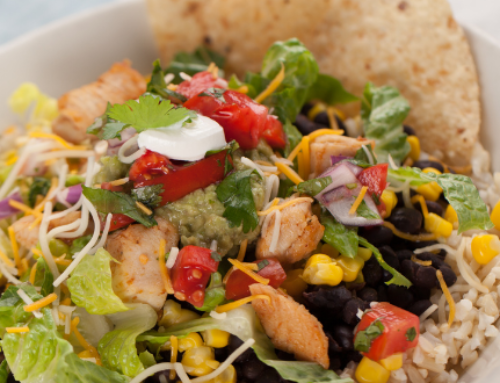As someone who has struggled with disordered eating for years, I am always skeptical of new fads–diet or otherwise–related to health and wellness. Keto, Atkins, Weight Watchers, Paleo, you name it, I can see the ways it can feed into existing disordered eating habits. It’s almost like a skill. But recently, I came across a new “fad” that stuck out to me as very, very different.
It’s called intuitive eating, and I wanted to give you some basic facts about it, because I think you’re going to be hearing about it a lot more in the months and years to come.
We’re all in a weird spot right now–a lot more isolated, away from support systems, constantly near our fridge, and staring at social media all day. Our bodies could use some love.
What is intuitive eating?
Intuitive eating is all about listening to your body and yourself and letting THAT–rather than society’s expectations, food labels, etc–guide your eating. It’s about stopping when you feel full rather than when the plate is empty. It’s about eating what your body NEEDS rather than what the calorie ratios say is the right food for you.
Many people who have struggled with disordered eating are turning to intuitive eating as a way to honor their bodies and build a better relationship with food and body image. Intuitive eating doesn’t call some foods bad and some good. It doesn’t limit you to certain macros–most intuitive eaters do not count macros (calories, fats, sugars, etc) at all.
We all know that every body is different–and that’s what intuitive eating honors. It honors your own desires and needs and encourages you to learn yourself and your body to tell the difference between nutritional hunger and emotional hunger. Intuitive eating is saying you should binge eat every time you feel fad–it’s about learning that your body wants ice cream when it’s sad and letting yourself have that versus punishing yourself for eating a bowl of ice cream one night.
For me, intuitive eating is about keeping foods I actually enjoy eating in my house and letting my body drive what I’m eating. If I’m doing a lot of yoga, I need to eat more than if I’m not, and my body is telling me that, not my mind.
How is it different from fad diets?
Intuitive eating is NOT a diet, and one of the key principles of it is rejecting diet mentality. There are no good or bad foods–just foods that make you feel good and other foods. Because intuitive eating is all about listening to yourself, it’s going to look different for every person. We all have different tastes and preferences and allergies and reactions to food, so my intuitive eating is not going to look like yours. It’s not about one menu for all–it’s about building a menu with YOU in mind.
Intuitive eating is also NOT about weight loss–it’s about honoring your body and what it needs, and calorie deficits are not part of the equation.
What are the main principles?
There are ten main principles of intuitive eating as laid out by the leaders of the movement.
-
-
Reject the diet mentality
-
Honor your hunger
-
Make peace with food
-
Challenge the food police
-
Discover the satisfaction factor
-
Feel your fullness
-
Cope with your emotions with kindness
-
Respect your body
-
Movement–feel the difference
-
Honor your health–gentle nutrition.
-
How can I practice intuitive eating?
-
Take baby steps, and you’ll find yourself further along the path than ever before. Start by picking foods based on taste and desire to eat them rather than their calorie count or how much they look like a salad–unless you are in the mood for a salad.
-
Remember, food is fuel. It is not the enemy.
-
Try pausing in the middle of a meal and seeing how hungry you are—are you full already?
-
Disengage from the people who call certain foods “good” or “bad”–simply tell them you don’t want to hear that language anymore.
-
Move in a way that makes your body feel good–don’t go run 10 miles because you ate a big lunch or you think you should. Run because you like the endorphins and the way it stretches your body. Stop when you don’t feel good anymore.
-
Unfollow accounts that are promoting diet pills, tummy teas, detoxes, obsessive gym regimes, and other diet mentality concepts.
-
Respect your body, and the body of others. We are all unique genetic blueprints–you don’t know whether someone else is healthy or not, and you don’t need to beat yourself up–or bully them–because of assumptions. Focus on how you feel and the fact that all our bodies are incredible for what they do for us every single day.












